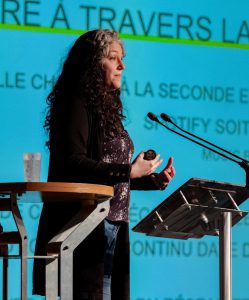On March 30, 2022, members of APEM and ADISQ gathered at Montréal’s Society for Arts and Technology (SAT) for the Music and Technology Summit x Rendez-vous de l’ADISQ to discuss the state of the music industry in Québec from the perspective of the technological considerations that affect it.

Jerome Payette
Moderated by Myriam Fehmiu, this afternoon of discussion began with the presentation of the first data on Québec’s streaming music consumption, by Marie-Julie Desrochers and Simon Claus of ADISQ. Although preliminary, the results of this research should shed more light on the precarious state in which Canadian music is evolving on these platforms. It has shown, among other things, that rap has the lion’s share as far as music made in Québec that’s being streamed online. It has also shown that hits have a much shorter lifespan online than on the radio; that the share of Québec artists in the streaming realm is only 8 percent; and that throughout 2020, this proportion experienced a significant decline, a trend that’s shown signs of a slow recovery since.
Next up was Jérôme Payette, APEM’s Executive Director, who presented an analysis of SOCAN royalties for music publishers in Québec. According to his interpretation of the numbers obtained from SOCAN, there has been an 8 percent decline in royalties paid to publishers since 2012. This is due in part to royalty sharing with a larger number of publisher members in total, and a drop in revenue from traditional broadcasts. Royalties from digital platforms are up, but not enough to offset the decline in royalties from traditional media, according to Payette. A 36 percent increase in revenues from international sources was also observed for the same period. Mr. Payette also insisted on the aspect of discoverability and visibility of Québec music, which is intrinsically linked to potential revenues from streaming, but also from synchronization and concerts. He concluded his presentation by inviting people to support the essential Bill C-11.

Jacynthe Plamondon-Émond
This was followed by a very interesting presentation from Jacynthe Plamondon-Émond, president of InTempo and founder of Amplitude Distribution, who shared her observations on the “echo chamber” of streaming platforms, meaning streaming services’ algorithms too often confines listeners to a limited number of musical choices shared with all listeners whop have similar tastes. This observation underlines the importance of similar artists in the algorithmic suggestions which act as a loop that limits the discovery of artists outside this echo chamber. Plamondon-Émond also talked about a project on the discoverability and export of Québec music, on which she’ll be working, in collaboration with Jean-Robert Bisaillon and his team at LATICCE (Laboratoire de recherche sur la découvrabilité et les transformations des industries culturelles à l’ère du commerce électronique – Research laboratory on discoverability and the transformation of cultural industries in the era of e-commerce).
A panel entitled “The secret is in the sauce, or how to succeed in the age of platforms” brought together Carlos Munoz (Joy Ride Records), Dorothée Parent-Roy (La Swell, Amplitude Distribution), Dix-Iple Deca (artist and entrepreneur), Guillaume Lafrance (Éditorial Avenue), and Shanti Loiselle (Analekta). The discussion was centred around the market share of music made in Québec, and the main challenges and various strategies of these stakeholders to increase this market share and to better reach their audiences.